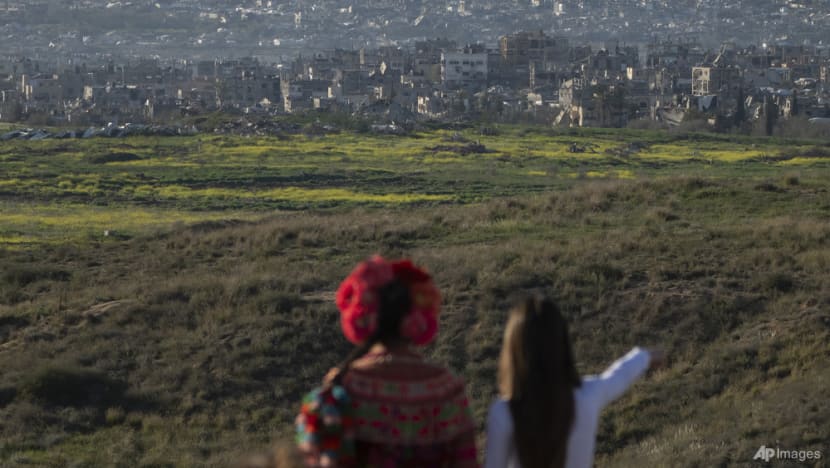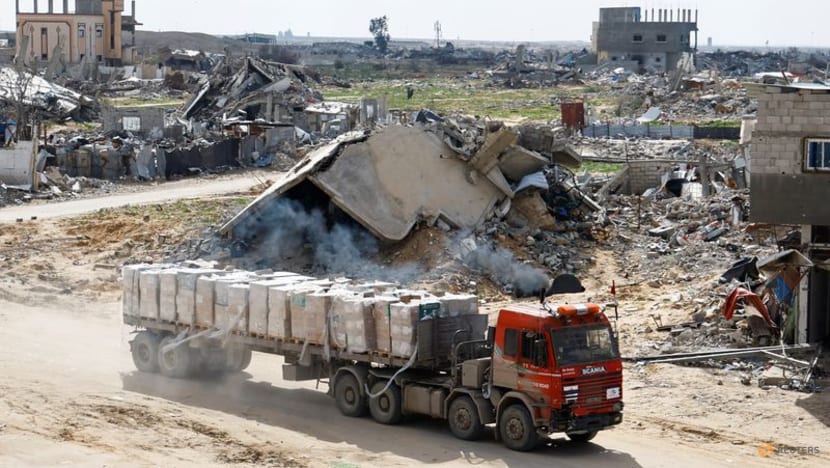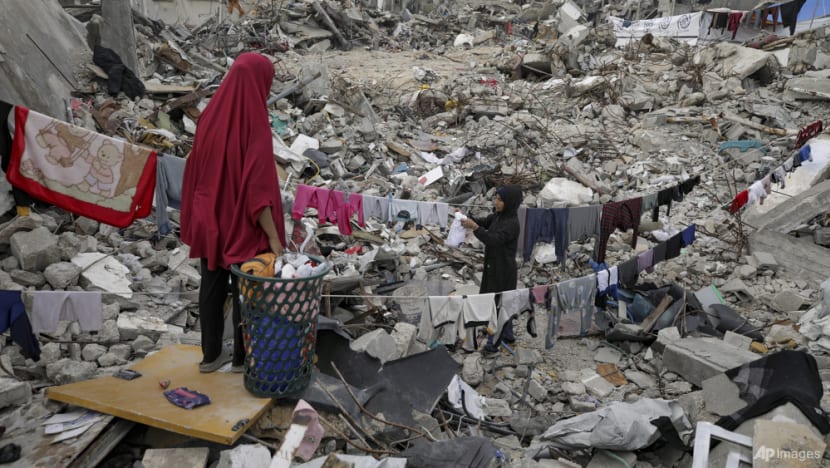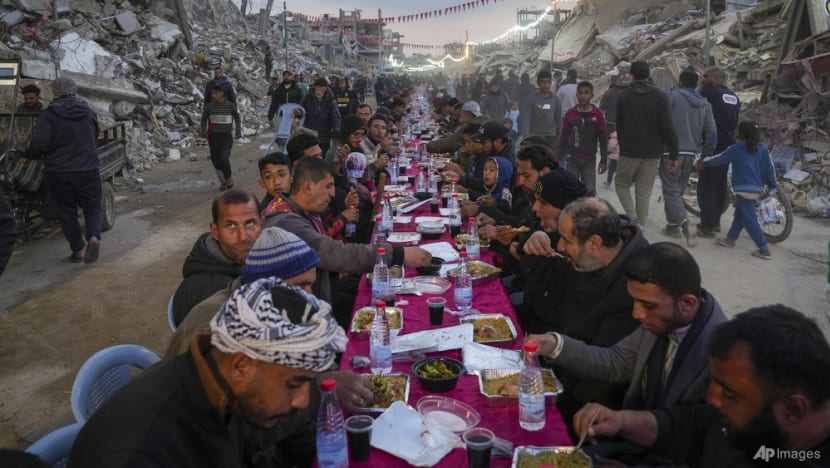Faltering ceasefire deal heightens risks of resumption of Gaza war, say analysts
Analysts say they believe Arab states should take a stronger stance on Israel over the Gaza ceasefire stalemate.

People look at buildings destroyed by Israeli air and ground offensive in the Gaza Strip, as seen from southern Israel, Mar 2, 2025. (Photo: Photo/Leo Correa)

This audio is generated by an AI tool.
As the Gaza ceasefire teeters on the brink of collapse, analysts said restarting the war will result in horrific consequences for Palestinians living in the already devastated enclave.
Israel on Sunday (Mar 2) blocked the entry of humanitarian aid into the Gaza Strip, hours after the first phase of the previously agreed ceasefire expired.
“It is a war crime to withhold humanitarian aid,” said Eyal Mayroz, a senior lecturer of peace and conflict studies at the University of Sydney.
“The Israeli government is using the (aid blockade) alongside other elements, trying to gamble that Hamas will succumb to pressure.”
Israel wants Hamas to accept a change in the ceasefire agreement proposed by United States special envoy Steve Witkoff. It would allow for the continued release of hostages without withdrawing Israeli troops from Gaza.
Israeli Prime Minister Benjamin Netanyahu also accused Hamas of stealing aid supplies.
Hamas has denied the theft accusations, calling Israel's aid blockade “blackmail” and a “blatant coup” against the original ceasefire agreement. The Palestinian militant group has appealed to Egyptian and Qatari mediators to intervene.
“There was an agreement in place. (All relevant parties) signed onto it. Now, Israel has decided not to honour the agreement,” said Nader Hashemi, associate professor of Middle East and Islamic politics at Georgetown University.
“I think it's going to lead to a resumption of the war. It's going to lead to the refusal of Hamas to free the remaining hostages. This is going to perpetuate the colossal suffering of the Palestinians, which is already at historic levels.”
The conflict has reduced Gaza into a rubble-strewn wasteland, with most of its 2.3 million population displaced and heavily dependent on international aid for food and other essentials.

WHY DID THE DEAL STALL?
Analysts said the second phase of the deal would have been difficult to implement as neither side wants to give up leverage – Israel would have to withdraw fully from Gaza, and Hamas would have to release the remaining 59 hostages.
Talks for the next phase never began, with Israel saying all its hostages must be returned for fighting to stop.
Experts said Netanyahu, who is facing multiple corruption charges in Israeli courts, has been extending the conflict to keep his political career afloat, and avoid the trials and possible conviction.
“Politically, restarting the war in Gaza helps Netanyahu. The longer the war continues, the longer he can stay in power,” said Hashemi.

More right-wing lawmakers of Israel’s coalition government are expected to quit if phase two comes into force. This could trigger elections in Israel, which Netanyahu is predicted to lose.
“The lifeline – if we can call it that – for (Netanyahu’s administration) depends on not going into phase two, because radical (lawmakers) are threatening to topple the government if Israel agrees to a full withdrawal from Gaza,” Mayroz told CNA’s Asia Now.
CAN ARAB STATES MAKE A DIFFERENCE?
Members of the Arab League are set to meet for an emergency session in Cairo on Tuesday to discuss a post-war plan for the besieged Palestinian enclave.
This comes after US President Donald Trump proposed a US takeover of Gaza and displacing its population into neighbouring Egypt and Jordan.
The Arab states, several of which hold diplomatic relations with Israel, could pressure Israel to reconsider the ceasefire agreement if they take a stronger stance, said Hashemi.
“Theoretically, if there was any sort of credible Arab leadership in the Middle East that is willing to take a firm stand in defence of the human rights of the Palestinians, then Arab states do have a lot of leverage over Israel,” he said.
“It's noteworthy that not one Arab state that has diplomatic relations with Israel has decided to sever those relations in the context of this (current) horrific situation in Gaza.”
Hashemi added that these nations, despite pressure from their own citizens who are outraged over the suffering of the Palestinians, are not willing to cut ties as they want to maintain a good relationship with Israel and the West.
“I'm not holding my breath that the Arab states are going to do what's needed to change the reality on the ground in Gaza and move things in a positive direction,” he said.
CAN US OR ISRAELI PUBLIC MAKE A DIFFERENCE?
The initial ceasefire agreement came into effect on Jan 19, just a day before Trump took office.
Analysts had said then that Trump was a driving force behind the deal that resulted in the longest ceasefire yet since the conflict started on Oct 7, 2023.
However, they also said Washington pressured Israel to sign the truce so that Trump could score a win even before his return to the White House.
“But now we're at a different moment,” noted Hashemi.
“Trump doesn’t need Gaza… to pursue his political programme. Netanyahu is not going to face any pressure from the Americans this time around,” he added.
“A lot of the blame… can be laid (on) the Trump administration, which refuses to press Israel to honour (the) agreement. Everyone in Trump's inner circle is a pro-Israel hawk.”

Instead, the US offered the proposal to extend the ceasefire for the Muslim holy month of Ramadan and Jewish feast of Passover, ending around Apr 20. Israel has adopted the plan and wants Hamas to do the same.
“(The US) is offering something that would work towards Israel's interest, but not Palestinian interest,” said Mayroz, adding that it is now left to simmering anger among the Israeli public to pressure Netanyahu on the ceasefire stalemate.
A poll by an Israeli news channel in January showed almost two-thirds of the Israeli public believed Netanyahu should resign.
Many families of the hostages still held in Gaza are bitterly critical of the government's response to the war and are calling for their relatives to be brought home “at all costs”.
“Strong Israeli public pressure may salvage the ceasefire. Much would depend on how much Netanyahu is afraid of Israeli public opinion versus the risk of toppling its government,” said Mayroz.
“I think Netanyahu wouldn't want to start the war again, but whether or not he may do that to salvage his government is on everyone's mind.”














